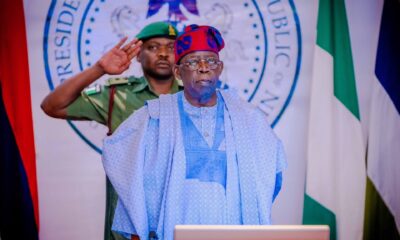Editorial
Towards Clean Energy Dev In Nigeria
In the global bid to combat the adverse effects of climate change, sustainability has come to the forefront of world
wide conversations. As the world battles to reduce harmful greenhouse gas emissions, greater emphasis has been placed on the search for clean energy sources. On 26th January, the entire world collectively turned its attention to this green pursuit by observing the International Day of Clean Energy.
This commemorative day serves as a grim reminder of our collective responsibility to navigate towards a future, powered by clean, sustainable energy. Embracing the use of clean energy is crucial in the battle against climate change. A substantial portion of the greenhouse gases that envelop our planet and retain the sun’s warmth are produced as a result of energy generation, achieved by the combustion of fossil fuels such as oil, coal, and gas, to generate power and heat.
To mitigate climate change, the global community must cease dependency on fossil fuels and allocate resources towards clean, readily accessible, cost-effective, sustainable, and dependable alternative energy sources. Renewable energy sources, such as solar, wind, hydro, bioenergy, and geothermal, hold great potential, being abundantly available and replenished by natural processes, while emitting minimal greenhouse gases and pollutants into the atmosphere.
Energy presents a dual challenge of inclusivity and environmental preservation. The solution to this challenge heavily relies on the adoption of clean energy sources. Amidst the global struggle against climate change, clean energy assumes a vital role in curbing emissions while simultaneously addressing the needs of communities deprived of reliable access to power. Regrettably, a staggering number of over 675 million people continue to endure a lack of electricity, with the majority residing in Sub-Saharan Africa.
For populations without access to clean energy, the absence of dependable power poses obstacles to education, healthcare, and economic prospects. Furthermore, many of these developing regions continue to heavily rely on polluting fossil fuels in their daily lives, thus perpetuating poverty. If present patterns persist, it is projected that by 2030, one out of every four individuals will still resort to hazardous, unhealthy, and inefficient cooking methods, such as burning wood or dung.
The current state of affairs indicates that despite some progress, the global community is not making sufficient headway towards the attainment of Sustainable Development Goal 7 (SDG7). This goal aims to provide universal access to affordable, reliable, sustainable, and modern energy by the year 2030. Thankfully, to evaluate the advancements made and propose viable remedies, the General Assembly has scheduled a Global Stocktaking on SDG7 to take place in April 2024.
Considering the abysmal energy poverty prevalent in the nation, individuals and organisations involved in the energy sector have emphasised the necessity of implementing inventive tactics to achieve a comprehensive electrification of Nigeria. Current data reveals that Nigeria possesses the largest disparity in energy access globally, with more than 90 million individuals lacking electricity.
Known for having one of the least efficient national grids in Africa, Nigeria is the leading purchaser of petrol and diesel generators in Sub-Saharan Africa. It is responsible for acquiring three million out of the total 6.5 million generators utilised in the region. Consequently, both individuals and businesses expend a substantial amount of $22billion per year on fuelling these generators. Additionally, the country heavily depends on fossil fuels for its vehicle energy needs.
The necessity for transitioning towards clean energy in Nigeria cannot be overstated. Reliance on fossil fuels not only contributes to detrimental environmental consequences like air pollution and climate change, but also presents substantial economic and security risks. The nation’s economy is at high risk of instability because of its heavy dependence on oil exports, which makes it vulnerable to global oil price changes, as evidenced in the past.
Moreover, the use of fossil fuels not only has adverse effects on the environment, such as air pollution and deforestation, but also poses risks to the health and well-being of the population. In contrast, opting for clean energy sources presents a more sustainable and environmentally-friendly approach to address the increasing energy requirements of the country. Incorporating renewable sources like solar, wind, and hydroelectric power into Nigeria’s energy portfolio can lead to a reduction in carbon emissions, enhance energy security, and foster the creation of employment opportunities in the renewable energy industry.
Nigeria, being the largest economy in Sub-Saharan Africa, is currently facing challenges in its energy sector as it strives to cater to the demands of its steadily increasing population. The nation’s reliance on fossil fuels is essential, with oil and gas accounting for about 90 per cent of its overall energy consumption as cited by the World Bank in 2021. This heavy dependence is attributable to several factors, including the abundant reserves of oil and gas, and the relatively affordable nature of fossil fuels in the country.
Our country faces a multitude of challenges following its heavy dependence on fossil fuels. These challenges include restricted access to electricity, an unstable power supply, and exorbitant energy costs. Reports indicate that only about 45 per cent of Nigerians have access to electricity, and even those who are connected to the grid frequently endure fluctuating power supply. The expense of energy in Nigeria is notably high because of various factors, such as the nation’s dependence on imported oil and gas, the substantial cost of generating electricity, and the inefficiencies and financial troubles afflicting the power sector.
Nigeria possesses a wealth of diverse energy resources that offer tremendous potential for clean and renewable energy production. These resources include abundant sunlight for solar power, vast expanses of windy coastal and mountainous regions for wind power, substantial biomass resources and significant reserves of natural gas. Harnessing these resources could herald a new era of green energy production for the country and the region.
The road to cleaner energy in our country may be fraught with various challenges, yet the possibilities are endless, and the benefits far-reaching. Putting Nigeria on the path to clean energy development will not only ensure the nation’s energy security but also contribute to global efforts to combat climate change. The concerted effort of all stakeholders is critical in this journey, with a guiding beacon of sustainable development illuminating the path ahead. Nigeria’s journey towards clean energy, though challenging, represents a promising leap forward for the nation, the region, and indeed, the world.
Editorial
HYPREP And The Collapsed Water Tank

Editorial
Resurgence Of Illegal Structures In PH
Editorial
Certificate Forgery, Loss Of Public Trust

-

 Featured5 days ago
Featured5 days agoOil & Gas: Rivers Remains The Best Investment Destination – Fubara
-
Nation5 days ago
MOSIEND Calls For RSG, NDDC, Stakeholders’ Intervention In Obolo Nation
-

 News5 days ago
News5 days agoNDLEA Arrests Two, Intercepts Illicit Drugs Packaged As Christmas Cookies
-

 News5 days ago
News5 days agoTroops Rescue 12 Abducted Teenage Girls In Borno
-

 News5 days ago
News5 days agoInvestment In Education Remains Top Priority For Gov Fubara – SSG
-

 News5 days ago
News5 days agoChina Alerts Rivers, A’Ibom, Abia Govs To Economic Triangle
-

 Featured5 days ago
Featured5 days agoLady Fubara Lauds Rivers Women On Peace, Development
-

 News5 days ago
News5 days agoTinubu Nominates Ex-INEC Chair Yakubu, Fani-Kayode, Omokri, 29 Others As Ambassadors

